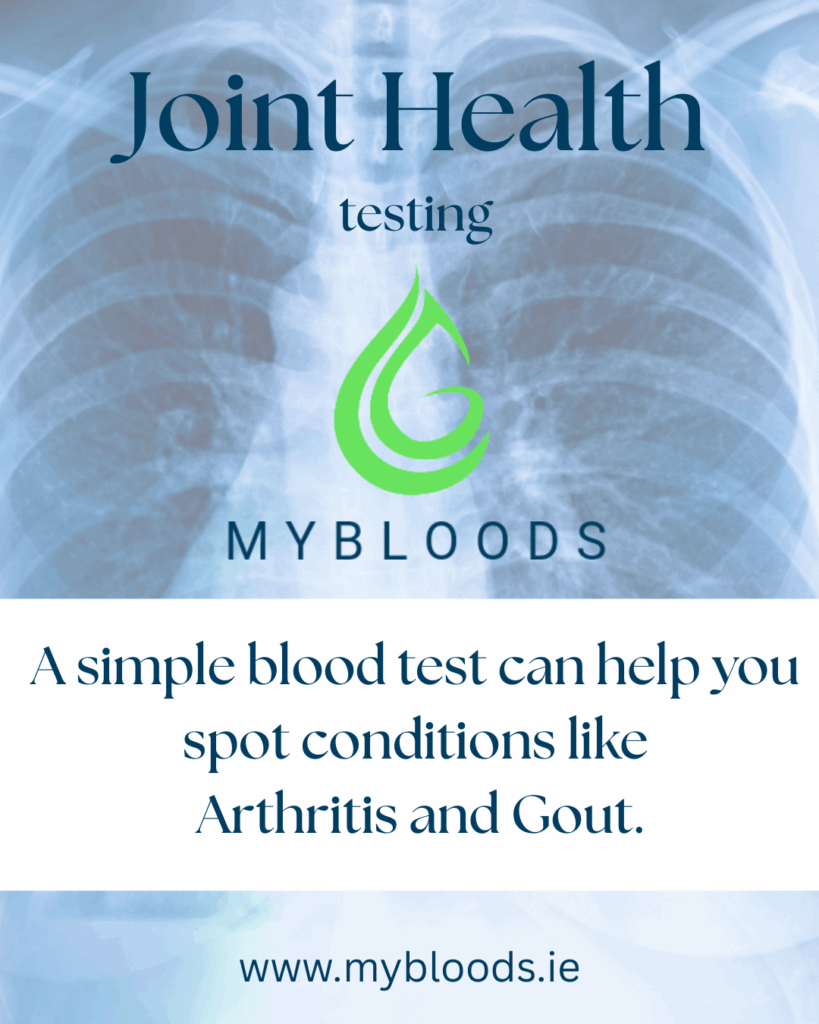
Joint Health: A Simple Blood Test Can Help Spot Conditions Like Arthritis and Gout
Joint pain and stiffness can significantly impact your quality of life, limiting mobility and daily activities. The good news? A simple blood test can help identify underlying joint conditions such as arthritis, gout, and others, enabling timely treatment and better management of symptoms. 🩸✨
In this article, we’ll explore what arthritis and gout are, discuss other common joint-related conditions, and explain how blood tests can be a game-changer in maintaining joint health.
Understanding Joint Conditions
What is Arthritis?
Arthritis refers to inflammation of the joints and is a leading cause of pain and disability. The two most common types are:
Osteoarthritis (OA): Caused by wear-and-tear on the joints over time, leading to cartilage breakdown.
Rheumatoid Arthritis (RA): An autoimmune disease where the immune system attacks joint tissues.
What is Gout?
Gout is a form of arthritis caused by the buildup of uric acid crystals in the joints. It often results in sudden, severe pain, commonly in the big toe.
Other Joint Conditions
Psoriatic Arthritis (PsA): Associated with the skin condition psoriasis, causing joint inflammation.
Ankylosing Spondylitis (AS): A chronic condition primarily affecting the spine and sacroiliac joints.
Lupus: An autoimmune disorder that can cause joint pain and swelling along with other systemic symptoms.
Symptoms to Watch For
If you’re experiencing any of the following symptoms, it’s worth investigating further:
Pain and Stiffness: Especially in the morning or after rest.
Swelling: In one or more joints.
Warmth and Redness: Around the affected area.
Limited Mobility: Difficulty moving the joint freely.
Sudden Intense Pain: Particularly in the big toe, as seen in gout.
Blood Tests for Joint Health
Key Blood Tests to Detect Joint Conditions
Rheumatoid Factor (RF): Identifies rheumatoid arthritis by detecting specific antibodies.
Anti-CCP Antibodies: Highly specific for diagnosing rheumatoid arthritis.
Uric Acid Levels: Elevated levels indicate gout.
C-Reactive Protein (CRP): Measures inflammation levels in the body.
Erythrocyte Sedimentation Rate (ESR): Indicates chronic inflammation.
Antinuclear Antibodies (ANA): Helps detect lupus or other autoimmune conditions affecting the joints.
Why Blood Tests are Important
Accurate Diagnosis: Pinpoint the exact cause of joint pain.
Early Intervention: Identify conditions early and prevent joint damage.
Personalized Treatment: Tailor treatments based on the specific condition.
Treatment Options for Joint Conditions
The treatment for joint conditions depends on the diagnosis but may include:
Lifestyle Changes:
Weight management to reduce joint stress.
Regular low-impact exercise to maintain joint flexibility.
Medications:
Anti-inflammatory drugs for arthritis and gout.
Disease-modifying antirheumatic drugs (DMARDs) for rheumatoid arthritis.
Uric acid-lowering medications for gout.
Physical Therapy: To improve strength and mobility.
Dietary Adjustments: Avoiding high-purine foods for gout or adding anti-inflammatory foods for arthritis.
Surgery: Joint replacement may be needed in severe cases.
Why Choose Blood Testing for Joint Health?
Testing for joint conditions offers numerous benefits:
🩸 Quick and Non-Invasive: Simple blood tests can provide a wealth of information.
⏱️ Early Detection: Catch issues before they progress.
🌟 Peace of Mind: Rule out other causes of joint discomfort.
📈 Actionable Insights: Get data to inform your treatment plan.
Take Control of Your Joint Health Today
Joint pain isn’t something you have to endure. At MyBloods, we offer comprehensive blood testing to help you understand the health of your joints. Flexible appointments, quick results, and no GP referral needed—getting clarity on your joint health has never been easier. 💪
